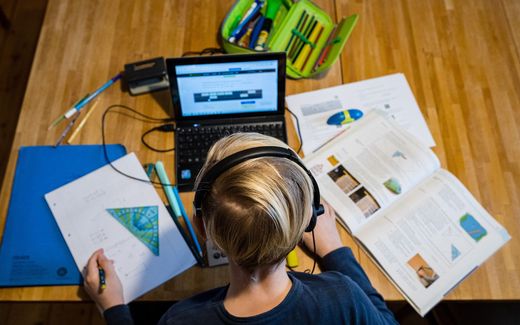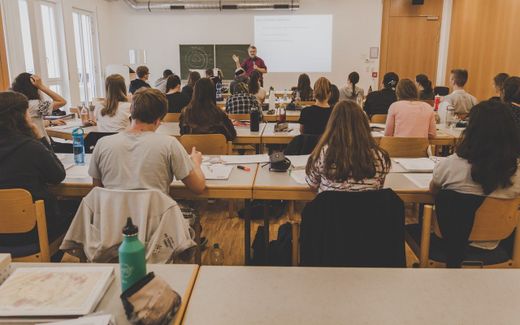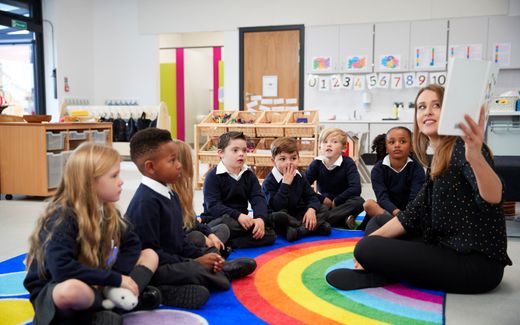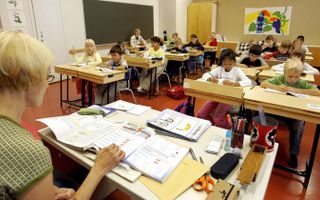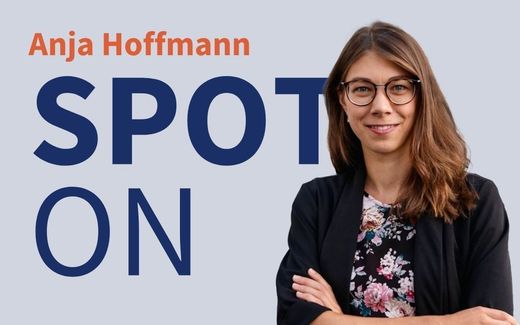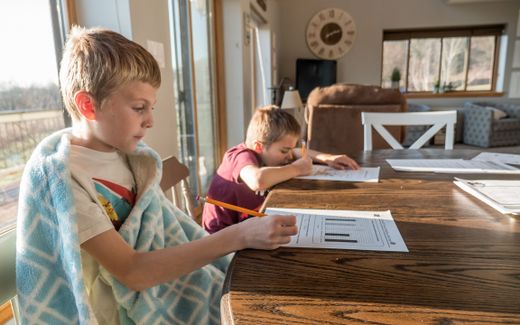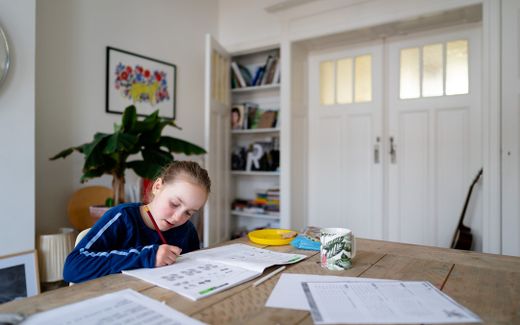Despite the debate about freedom of education, the future seems bright for private schools
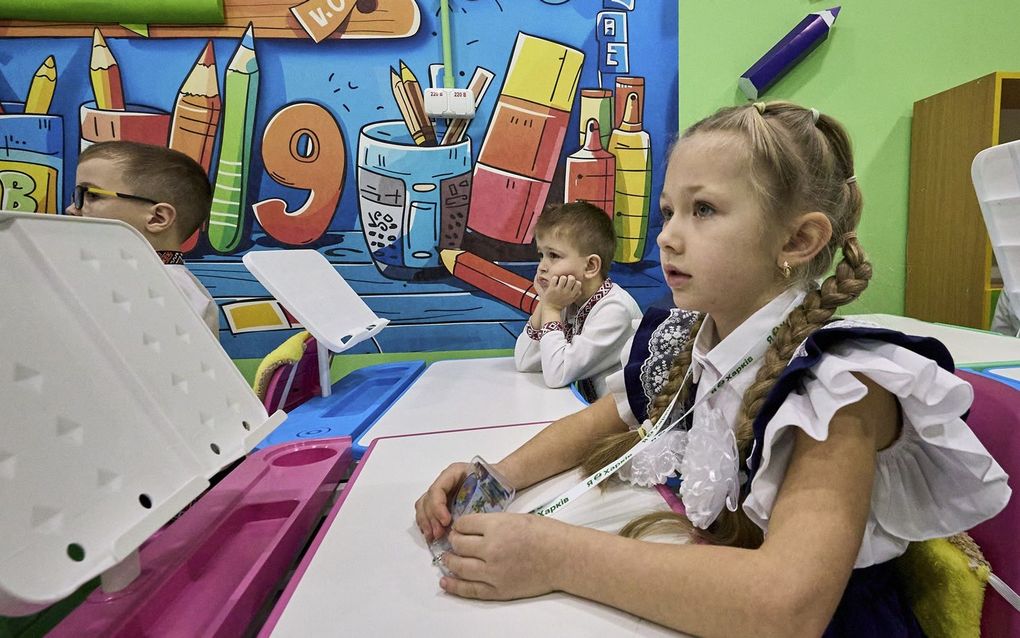
Children in Ukraine attend school in underground facilities. Photo EPA, Sergey Kozlov
European Union
Do Christian schools indoctrinate children? That is one of the questions in the growing debate around freedom of education. At the same time, freedom of education flourishes and even has a future, says the NGO OIDEL in a new study.
Stay up to date with Christian news in Europe? Sign up for CNE's newsletter
Ignasi Grau, director of OIDEL, has been busy travelling. All over Europe, he has been asked to present his report on Freedom of Education. In June, he will go to the European Parliament in Brussels, but the end of his tour is finally nearing. It shows how great the interest in the topic is, he says. “Freedom of education will be a hot iron in the coming years.”

How does Grau define freedom of education? He sees it as the possibility parents have to choose education that is in line with their convictions, regardless of their income. In countries with this freedom, private schools are just as affordable and accessible as public schools.
This definition of freedom of education in the OIDEL report goes beyond the freedom to start a Christian school. Even though religious and moral convictions are the most important reason for parents to choose a non-governmental school, this freedom still applies to all groups that do not feel represented in the main public educational system, Grau says.
In the meantime, he is optimistic about the development in the field of freedom of education. Looking at the report that OIDEL released earlier this year, he sees positive developments. Whereas funding for private schools used to be rare in the past, there is much more money on the table now in more and more countries. Of the 156 surveyed countries, only 25 per cent do not provide any form of funding for non-governmental schools. And the number of countries with some form of funding for private schools is growing, Grau says.
“People want alternatives to the public education system, and the state provides them with this possibility.”
The survey shows that a little over 25 per cent of the surveyed countries have a robust funding system for private schools. That usually means that most teachers of private schools are paid with public money. Two or three countries, including the Netherlands, go as far as paying for investments and educational resources for private schools as well.
Alternatives
Even though OIDEL did not specifically research the reasons behind the trends in freedom of education, he thinks this is because of the growing call for alternatives to mainstream education. “Countries are responding to the demands of their citizens”, he believes. “People want alternatives to the public education system, and the state provides them with this possibility.”
The US is a good example of this trend, the director of OIDEL illustrates. There, he sees that more and more states implement policies that enable families to choose a school that meets their personal convictions and beliefs. Take, for instance, Florida, which saw a large increase in private schools. OIDEL consulted an expert who has studied this trend closely. He attributed the boom in private education to the fact that once parents experience a genuine alternative, they are reluctant to give it up. Moreover, the trend becomes self-reinforcing: as parents observe the availability of private education in other regions, they increasingly want that option for their own children as well.
A few years ago, the group that is now the European Alliance for Christian Education (EACE) already noticed a growth in private education in Europe specifically as well. According to some people at the time, this development could be a reaction to the political developments all over Europe that forces public schools to teach liberally about gender and sexuality.
Ignasi Grau from OIDEL adds that the need for private schools is increasing because Western societies are increasingly pluralistic. “Europe used to be overall Christian, but now we have Muslims, Buddhists, Hinduists and people with specific views on education, who all an education that is in line with their core beliefs.”
Political attention
The growing need for adaptable education is also seen in the growing demand for homeschooling. Even though this was not the primary focus of OIDEL’s research, Ignasi Grau acknowledges that homeschooling is a good indicator of how seriously states take educational freedom.
“Countries are concerned about losing control over the education of their citizens.”
Currently, homeschooling is a topic that is at the centre of political attention, he says. At the end of this month, he expects UNESCO to release guidelines to help governments regulate this growing phenomenon.
However, it is hard to say whether the developments in the field of homeschooling will be positive or negative for the freedom of education, Grau thinks. Some countries, like Serbia and Bulgaria, are making it easier for parents to educate their children at home. Meanwhile, France and Switzerland are putting more limitations on homeschooling. And Germany has already blocked this option long ago.
According to Grau, the issue of home education is becoming more politicised. “There is a growing demand for homeschooling, and countries are concerned about losing control over the education of their citizens. The amount of freedom parents have to homeschool their children is an indicator of how much a state trusts the parents.”
Interest
Despite the good news regarding the freedom of education in the world, there are also concerns. In some countries, parental rights are under pressure, OIDEL notes in its research. As education becomes increasingly politicised, Ignasi Grau thinks it is a matter of time before this translates into more laws and regulations.
One of the strongest backlashes against educational freedom in Europe lately has been seen in Spain, he says. There, the government passed a law that only guarantees funding to public schools. Private schools only receive public money in places where governmental schools cannot serve all the students in the area.
“The fact that some political parties contest that freedom is something that is telling about democracies today.”
Furthermore, soft persecution in the field of education is something that schools should be prepared for. “Politicians tend to want control over everything”, Grau says. “All over Europe and elsewhere in the world, we hear about political parties that are uncomfortable letting people choose their education.” And that is a concerning development, according to him. “When a democracy is flourishing, citizens are happy and can choose alternatives to the public systems. That is very important in the field of education because that is where we choose what is worth preserving and passing down to the next generations. The fact that some political parties contest that freedom is something that is telling about democracies today.”
Even though Grau does not think a ban on non-governmental schools is realistic anytime soon, he warns that politicians can impose requirements that make it really difficult for private schools to exist. “They can say that you have to run a certain curriculum. And these requirements may go against the values of a school. If a Christian school has to make the Bible compatible with certain post-modern views, it will be a zero-sum game. That kind of requirements cannot be met.”
Part of the problem, Grau believes, is the declining demography in many parts of the world. As fewer children are born, the classes at schools will become smaller and smaller in the future. Not all schools will survive this big loss of students, the OIDEL director expects. “And politicians would rather close non-governmental schools than public ones.”
Compromises
Despite this all, Ignasi Grau still remains optimistic. “At one point, we will have to find an agreement. In Europe, political parties do not have a large majority, so they must find balancing compromises.”
Non-governmental schools, including Christian schools, should be aware of the role they can play in the debate, Grau warns. “There should be more dialogue between the schools and the governments. How can we resolve the tension between worldviews? That question is often missing in conversations. We have to show that indoctrination and exposure are two different things. For example, in the debate around sexual education, Christian schools should show that they can still teach the subject without imposing a specific worldview.”
In addition, non-governmental schools should not forget that they have the power to influence the government, Grau says. “If governments want to have a common sexual curriculum, all reasonable citizens have to be comfortable with that. And even though most countries in the West are secular, religious communities are still big, and they matter. They must realise that they belong to society and have the power to speak up.”
Therefore, Grau is still optimistic. “Sometimes, we pay more attention to what is not going well. But the overall tendency in freedom of education is positive. We see more parents who want an alternative to public schools, and more governments provide funding. Basically, the outcome of our research shows that the field of education is like a forest. It makes more noise when a tree falls than when it grows. Despite the noise of political discussions, the main tree still grows.”
How to convince others that freedom of education is relevant
There are some good reasons that make freedom of education worth defending, the report from OIDEL shows:
Freedom of education is a human right. The Universal Declaration of Human Rights states that parents have the right to choose education for their children, the report points out. Freedom of education is necessary to ensure that this right can be exercised, its authors argue.
Freedom of education leads to more equality in society. Because educational freedom includes access to non-governmental schools regardless of income, low-income families should also be able to send their children to private schools that are in line with their convictions. This improves the education of the children of these families, according to the researchers and leads to greater social mobility and better incomes for the next generations.
Freedom of education is connected to better academic results. Research shows a positive link between educational freedom and academic results, OIDEL points out in its report. If there is competition between public and private schools to gain more students, schools have an incentive to become the best. That leads to better education and higher academic performance. In the long run, this will result in more economic growth and other societal benefits.
More non-state schools lead to higher efficiency in education. Often, private schools are more cost-effective than public schools, the OIDEL report says. If more children attend private schools, this would lead to more efficiency in education.
Related Articles


